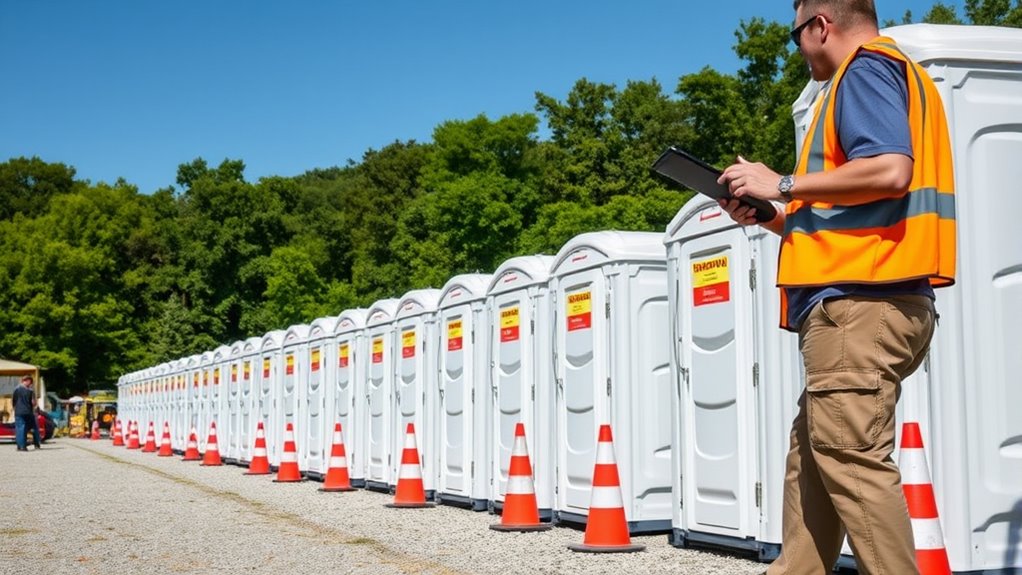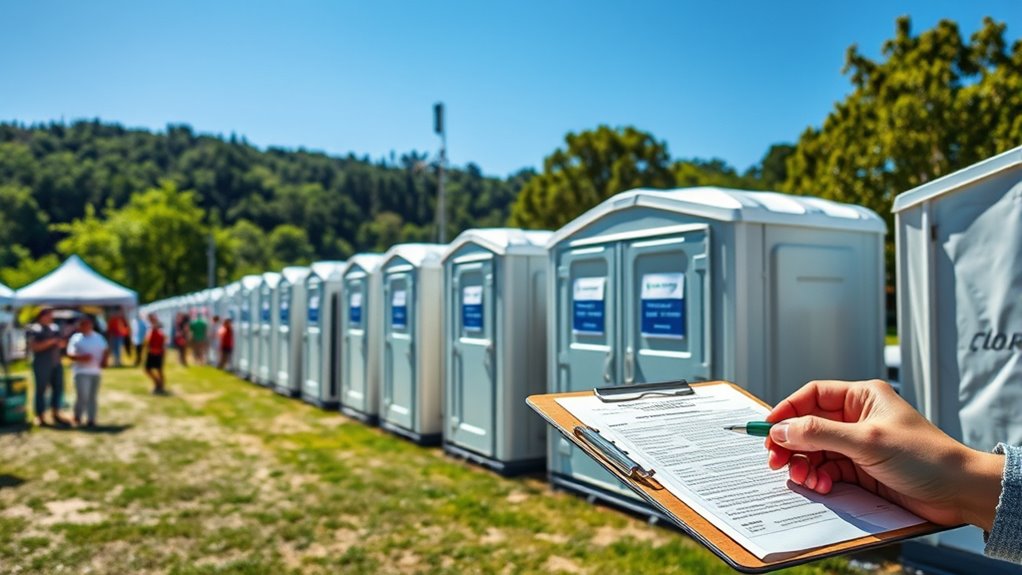To navigate permits for event portable sanitation, you need to check local ordinances and understand requirements for permits and insurance. Make sure you have proper sanitation permits and extensive insurance policies that cover potential liabilities. Prepare detailed site plans, proof of insurance, and sanitation service agreements in advance to streamline approval. Staying compliant with environmental standards and maintaining open communication with officials will help your event run smoothly. Keep going to discover how to master the permit process seamlessly.
Key Takeaways
- Verify local ordinances to determine requirements for portable sanitation based on event size and location.
- Obtain proper sanitation permits by submitting detailed site plans, waste disposal methods, and sanitation service agreements.
- Ensure comprehensive insurance coverage is in place to protect against liabilities related to sanitation facilities.
- Comply with environmental standards and health codes to avoid penalties and ensure safe sanitation practices.
- Maintain open communication with local authorities and prepare all documentation for smooth inspections and permit approval.

Organizing a successful event requires ensuring proper sanitation, which often means obtaining the necessary permits beforehand. When it comes to portable sanitation, understanding the legal essentials is vital to avoid fines, delays, or even event shutdowns. One of the first steps is to familiarize yourself with insurance requirements. Many local authorities mandate that event organizers carry specific insurance policies that cover sanitation facilities. This isn’t just a bureaucratic formality; it protects you from potential liabilities related to accidents, damages, or health violations caused by sanitation services. Confirming your insurance is up-to-date and extensive can also streamline the permit approval process, as agencies will want proof that you’re prepared to handle any sanitation-related issues responsibly. Additionally, understanding the importance of environmental standards in your planning can help ensure compliance and sustainability for your event.
Proper sanitation permits and insurance are essential for a successful, compliant event.
Equally important is complying with local ordinances. Different cities and counties have varying rules regarding portable sanitation. Some areas may specify the number of units required based on your expected attendance, while others might have strict guidelines on the placement and maintenance of these facilities. To avoid surprises, you should consult your local health department or municipal office early in your planning. They’ll provide detailed information about permits, safety standards, and inspection requirements. Failing to meet local ordinances can result in penalties, or worse, your event being shut down. Making sure your sanitation setup aligns with these regulations isn’t just about legality; it also ensures your guests have access to clean, safe facilities throughout your event.
Another aspect to consider is the documentation required for permit approval. Typically, you’ll need to submit detailed plans describing the number and placement of portable toilets, hand-washing stations, and waste disposal methods. These plans often need to demonstrate compliance with local health codes and environmental standards. Having your insurance documentation, site plans, and sanitation service agreements ready can expedite the approval process. Remember, authorities want to see that your event will not only be enjoyable but also safe and environmentally responsible.
Finally, stay proactive about inspections. Many jurisdictions will conduct on-site evaluations before and during your event to verify compliance. Being prepared with all necessary documentation, including proof of insurance and adherence to local ordinances, can make these inspections smoother. Maintaining open communication with local officials can also help resolve any issues swiftly, ensuring your event runs without a hitch. By understanding and fulfilling insurance requirements and local ordinance compliance, you set a solid foundation for a successful event—clean, compliant, and worry-free.
Frequently Asked Questions
How Early Should I Start the Permit Application Process?
You should start the permit application process at least 4 to 6 weeks before your event. This permit timeline allows ample time for processing and handling any unexpected delays. Follow these application tips: gather all required documents early, double-check submission details, and stay in contact with local authorities. Starting early guarantees you meet all legal requirements smoothly, avoiding last-minute stress and ensuring your portable sanitation setup is ready on time.
Are There Specific Permits for Different Types of Events?
Yes, different types of events often require specific permits based on event zoning regulations and the nature of your event. For example, outdoor festivals might need special permits, while smaller gatherings may only require basic approvals. You should check with local authorities early, as permit fees vary depending on event size and location. Understanding these requirements guarantees you’re compliant and helps you avoid costly delays or fines.
What Are the Consequences of Operating Without Permits?
Imagine your event without permits—sounds fun, right? But permit violations invite serious trouble, including hefty fines, shutdowns, and legal liabilities. Operating without permits isn’t just a bad idea; it’s a fast track to costly legal troubles and damage to your reputation. You might think you’re saving time, but in reality, you’re risking everything. Always secure the necessary permits to keep your event compliant and avoid these avoidable pitfalls.
Can Permits Be Transferred if the Event Location Changes?
When your event location changes, you might wonder if a permit transfer is possible. Generally, permits are specific to a location, so a permit transfer isn’t automatically granted. You need to contact the issuing authority to request a location change. They’ll review your case and may require you to apply for a new permit or submit additional documentation. Always check local regulations to guarantee compliance and avoid delays.
How Do Local Regulations Vary Across Different States?
When you explore how local regulations vary across states, you’ll find that state-specific regulations greatly influence permit requirements for portable sanitation. Regional permit differences mean you must research each state’s rules, as some may have stricter health and safety standards or specific licensing processes. You need to stay informed about these variations to guarantee compliance, avoid penalties, and secure the necessary permits for your event sanitation needs.
Conclusion
Mastering the world of event sanitation permits might seem intimidating, but with the right knowledge, you can handle it like a true modern-day impresario. Remember, securing the proper permits guarantees your event stays on the right side of the law—no need to channel your inner Marie Antoinette! Stay proactive, double-check regulations, and don’t forget — a well-permitted event is a successful one. Embrace these legal essentials, and your event will be the talk of the town (or at least the castle).









